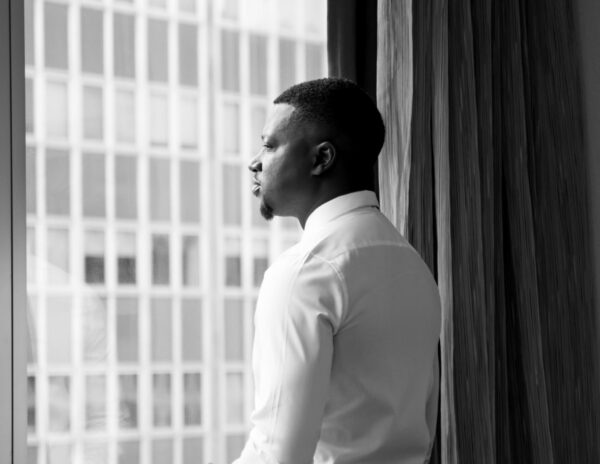Organizer of the AfroGlobal Connect Forum, Thione Niang sees Guinea as more than just a country undergoing reconstruction: it is a symbol of African rebirth. In this exclusive interview with Financial Afrik, the entrepreneur and founder of AfroGlobal Connect shares his deep conviction: Guinea is ready to embody the awakening of a giant, at the crossroads of political ambition, youth, and human capital.
Interview by Dia El Hadji Ibrahima
⸻
Financial Afrik: You traveled through several continents before launching AfroGlobal Connect. How did this initiative come about?
Thione Niang: After a long journey through 17 countries in America, Europe, Asia, and Africa, meeting our diaspora, I understood one thing: the development of the continent depends on collaboration between Africa and its children abroad. From this conviction, AfroGlobal Connect was born, a platform that brings together investors, decision-makers, youth, and the diaspora around concrete projects.
And it is in Guinea that this vision makes the most sense. The country is at a historic turning point, driven by a dynamic youth, ambitious reforms, and a willingness to open up. Guinea is now one of the best places in Africa to move from intention to investment.
This past weekend on Saturday, October 4th, Guinea hosted investors, decision-makers, the diaspora, and leaders from around the world in Conakry — all gathered to build the future of a Guinea that believes in itself and invests in its own success.
Under the theme “Impact Investing in Guinea,” this meeting marked a historic turning point: a generation of builders determined to transform the country’s wealth into sustainable growth, jobs, and dignity.
⸻
Why did you choose Guinea?
I am in Guinea because I have seen with my own eyes what is being built here. President Mamadi Doumbouya’s vision is clear, priorities are defined, and everything is in place to succeed. The country is opening up to the world while retaining control of its destiny. I have met a leadership that knows where it is going, with visible results: the recent B+ rating from Standard & Poor’s confirms market confidence.
With a manageable public debt, equivalent to 36% of GDP, and its own currency, the Guinean franc, Guinea illustrates a rare monetary sovereignty in the region. In three years, it has become the second largest French-speaking economic power in West Africa — the result of a rigorous and courageous refoundation policy.
How do you assess the government’s economic vision?
Under the impetus of President Doumbouya and Minister Djiba Diakité, Guinea is making progress methodically. The creation of the Guinea Sovereign Fund, structural reforms to attract investments, industrial policies aimed at locally transforming resources, and the Simandou Academy dedicated to human capital reflect a coherent vision: laying the foundations for sustainable economic sovereignty.
Simandou 2040 is often cited as a flagship project. What is your interpretation?
The mega-project Simandou, estimated at $20 billion, with over 8 billion tons of 65% pure iron ore, is more than just a mining project. It is a lever for regional transformation and a symbol of co-development.
The Simandou 2040 program aims to reinvest ore revenues in agriculture, education, infrastructure, and finance. And with the Simandou Academy, the government is investing in the future: young people will be trained to become the engineers, technicians, and leaders of tomorrow.
Why do you consider Simandou a model of international cooperation?
Because it brings together, for the first time, Western and Asian actors under common governance — Rio Tinto, Baowu Steel, Winning Consortium, and Chinalco — under the coordination of the Strategic Committee chaired by Minister Djiba Diakité. The TransGuinéen Company (CTG) symbolizes this fusion of rigor, efficiency, and African leadership. It is the face of the new global balance, where Africa is no longer a spectator but a full partner.
What role do youth and the diaspora play in this movement?
The Guinean youth, representing over 70% of the population, is the key to everything. With over 13 million hectares of arable land and programs like Guinée+, the country is creating an ecosystem where innovation, agriculture, and technology converge. As for the diaspora, it plays a strategic role: investing, transmitting, and returning to build. This is why AfroGlobal Connect exists: to create bridges between those who have left and those who are building here.
You often talk about “African soft power.” How do you apply it concretely?
I believe that economic development must be accompanied by work on our image, narratives, and symbols. For several years, through my media initiatives, I have been striving to tell the African story differently — an Africa of action, dignity, and solutions.
Soft power is our ability to influence the world through our stories, successes, and culture. And it is here, in Guinea, that I see an ideal ground to showcase this Africa that is moving forward, building, and inspiring.
Any final words?
On the mountains of Simandou, I have seen with my own eyes what Africa can become when it unites its forces. Guinea proves that with a clear vision, strong institutions, a sovereign currency, and educated youth, the continent can write its own story.
Simandou is not just a mining project. It is a symbol of an Africa that transforms, asserts itself, and inspires.


